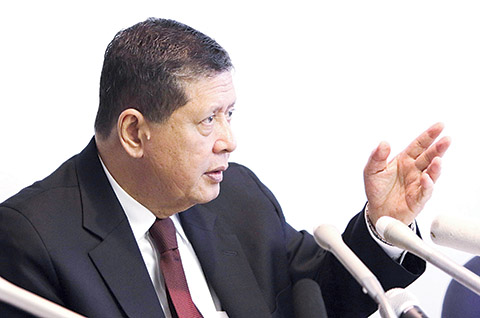SEOUL: North Korea said yesterday it had arrested a US student who, under orders from Washington, had engaged in unspecified "hostile activities" after entering the country on a tourist visa. The detention comes at a sensitive time, with the United States taking a leading role in international efforts to secure tough sanctions on North Korea over its latest nuclear test. The student, identified as Frederick Otto Warmbier from the University of Virginia, had entered North Korea as a tourist "in order to shake the foundation of the DPRK's unity under the direction of the US government", the North's official KCNA news agency said, using the official acronym for North Korea. "He was arrested while carrying out anti-DPRK hostile activities and is now under investigation," it added.
The term "hostile activities" is a catch-all accusation that has been levelled at numerous detained foreigners in the past - covering a range of possible charges from spying to illicit missionary work. The latest arrest comes months after the North released a South Korean man studying at New York University. Arrested in April for illegal entry, Joo Won-Moon, a 21-year-old with permanent US residency, was freed in October through the border truce village of Panmunjom on the inter-Korean frontier. Unlike some other foreign citizens detained in the North, Joo was never put on trial. The United States has no diplomatic or consular relations with the North, and the Swedish Embassy in Pyongyang provides limited consular services to US citizens detained there.
New Solution
Meanwhile, South Korean President Park Geun-Hye yesterday offered a "creative" solution to stalled six-party talks on North Korea's nuclear program - cut Pyongyang from the equation and make them five-party negotiations instead. "We should find various and creative approaches, including attempting to hold five-way talks excluding North Korea," Park said during a policy briefing with top ministers.
The six-party talks, involving the two Koreas, the United States, Japan, Russia and China, began in 2003 as an effort to dismantle North Korea's nuclear program in exchange for aid. The North quit the dialogue process in 2009, ostensibly to protest sanctions imposed after a long-range rocket test. The following month it conducted its second nuclear test. North Korea's main ally, China, has repeatedly pushed for the talks' resumption, but Park said the North's fourth nuclear test on Jan 6 underlined Pyongyang's rejection of denuclearization as a bargaining chip. "Even if the talks are resumed, their effectiveness would certainly be called into question," she said.
At a later press briefing, South Korean Foreign Minister Yun Byung-Se said excluding North Korea would serve as a powerful signal of the international community's anger and frustration. "If this takes place, it will send a very strong message to North Korea both substantially and symbolically," Yun said. On top of the five-way talks, South Korea's top diplomat said his government was also considering a "diverse dialogue framework" that could kick-off with a "three-way cooperation body" involving South Korea, the US and China.
The latest test triggered a flurry of diplomatic activity between the five non-North Korean members of the defunct talks process, with the US, Japan and South Korea urging China to take the lead in imposing stronger sanctions on its maverick neighbor. "I expect China to take effective measures to make sure North Korea can recognize that the development of its nuclear programs serves no purpose, and that it should re-join the international community as Iran did," Park said.
Beijing will have a crucial role to play in the wording of the resolution currently under discussion within the UN Security Council to punish Pyongyang for its latest test. China is North Korea's chief diplomatic protector and economic benefactor, but Beijing's patience has worn thin with Pyongyang's behaviour and unwillingness to rein in its nuclear weapons ambitions. However, China's leverage over Pyongyang is mitigated by its overriding fear of a North Korean collapse and the prospect of a reunified, US-allied Korea directly on its border. - Agencies



